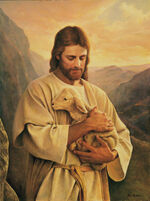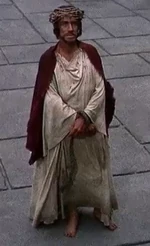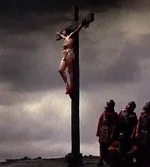
Jesus (c. 22 December 4 BC - 3 April 33 AD), also known as Yeshua in Hebrew or Jesus Christ, was a Jewish rabbi and religious leader whose teachings became known as Christianity. Christians believe that he is the son of God and the awaited Messiah prophesied in the Old Testament, and they believe that, after he was crucified by the Romans (after being betrayed to the Romans by the Jewish authorities), he died and was resurrected. Christianity and Islam believe that he will return to Earth during the end times to judge the living.
Biography[]
Jesus was born in the city of Bethlehem, Judea in 4 BC. He was the son of Mary, and Christian tradition holds that he was conceived through God's Holy Spirit, and that Mary was a virgin when she gave birth to Jesus; Saint Joseph was Jesus' foster father. Jesus was born in a barn, and three wise men, told that the king of the Jews was being born, found him by following a star and brought to him gifts of gold, frankincense, and myrrh. After Jesus was born, Joseph had a dream that King Herod the Great would attempt to kill Jesus, so Jesus, Mary, and Joseph fled to Egypt, remaining in Sais, Lower Egypt until Herod died. Afterwards, they returned to Judea, settling in their hometown of Nazareth (Joseph had been in Bethlehem to register for the Roman census).
Ministry[]

Jesus during his ministry
When Jesus was twelve, he went missing on a family trip to Jerusalem, and he was found in a temple sitting among the teachers, listening to them and asking questions. Years later, Jesus was baptized in the River Jordan by John the Baptist, and it is said that God told John that Jesus was his son. Jesus went on to become a public minister himself, appointing twelve apostles at the start of his ministry: Saint Peter, Saint Andrew, James, son of Zebedee, John the Apostle, Philip the Apostle, Saint Bartholomew, Saint Matthew, James, son of Alpheus, Thomas the Apostle, Saint Simon, Jude Thaddeus, Saint Matthias, Saint Paul, and Judas Iscariot. Jesus became a rabbi and preached his message orally, and he forbade those who recognized him as Messiah to speak of it. He called on people to repent their sins and devote themselves completely to God, and he also told his followers to adhere to Jewish law, and his teachings included loving your enemies, refraining from hatred and lust, turning the other cheek, and forgiving other people who have sinned against you. He devoted a large portion of his ministry to performing miracles, such as feeding 5,000 people with seven loaves of bread and fish, calming a storm in the Sea of Galilee, resurrecting the dead, curing the blind, and walking on water.
A key event in Jesus' life was Saint Peter confessing that Jesus was the Messiah, the son of the living God, and Jesus later transfigured after taking Peter and two other apostles to a mountaintop. Jesus went on to ride into Jerusalem on a donkey, and people along the way laid cloaks and palms in front of him. Jesus expelled money chargers from the Second Temple, and he later came into conflict with the Jewish elders when they questioned his authority; he criticized them and called them hypocrites, and they convinced Judas to betray Jesus to them for 30 silver coins.
Last Supper and betrayal[]

Jesus wearing the crown of thorns
During what came to be known as the "Last Supper", Jesus shared a final meal with his apostles, telling them that one of them would betray him. He took bread, broke it, and gave it to his disciples, telling them that it was his body, which was given to them. He then had his disciples drink wine, telling them that it was his blood. After the meal, Jesus washed his disciples' feet, and he predicted that Peter would deny knowledge of him three times before the next morning. Jesus then went to the Gethsemane garden, where Judas and an armed mob arrived. Judas kissed Jesus to identify him to the crowd, who then arrested him. Peter attempted to stop Jesus' arrest by slashing off the ear of a Roman soldier, but Jesus performed another miracle, placing the ear back on the soldier. When questioned, Peter thrice denied knowledge of Jesus, fulfilling Jesus' prophecy.
After his arrest, Jesus was taken to the Sanhedrin judicial body, and he was mocked and beaten at the house of high priest Caiaphas. During his trial, Jesus spoke very little, mounted no defense, and gave infrequent and indirect answers to questions. Jesus was accused of blasphemy when he called himself the "Son of God", and he was then taken to the court of Prefect Pontius Pilate. Pilate realized that Jesus came under the jurisdiction of tetrarch Herod Antipas, and Herod and his soldiers mocked Jesus before sending him back to Pilate. Pilate announced that he had not found Jesus guilty, and he allowed for one prisoner to be released during Passover: either the violent criminal Barabbas or Jesus. The crowd chose to release Barabbas and crucify Jesus, and he was whipped, tortured with a Crown of Thorns, and forced to carry a cross to Golgotha (Calvary).
Crucifixion[]

A crucified Jesus
At Calvary, he refused a painkiller, and he was crucified alongside two criminals. Jesus asked God to forgive those who condemned him to death, saying that they knew not what they were doing. Jesus also entrusted the care of his mother Mary to his disciple John the Apostle. The Roman soldier Saint Longinus then stabbed Jesus in the side with a spear to ensure that he was dead. Joseph of Arimathea later removed Jesus' body from the cross and buried him in a rock-hewn tomb, but, according to Christianity, he was resurrected and disappeared from his tomb. In Mormonism, Jesus was said to have visited the Americas after his resurrection, convincing the Lamanites to become righteous and join the Nephites. According to most Christian denominations, after Jesus' crucifixion and resurrection, he ascended into Heaven and sat at the right hand of God, and it was prophesied that he would later come to judge the living during the end times.

